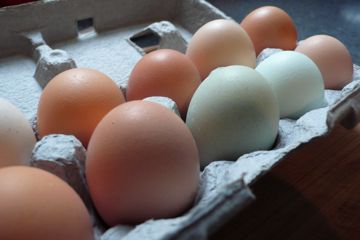Les Oeufs
 Regularly, I subject myself to the guilt of being an omnivore. I don’t consciously make a point of punishing myself for being an eater of animals, but somehow it seems that I am regularly drawn to reading about the meat industry and how irresponsible much of it would appear to be. Ultimately, I suppose I’m trying to justify the fact that I still love to eat meat; that bacon would be forever banished from my life is inconceiveable. I know myself and I will not become a vegetarian. The least I can do (as I look at Sammy and wonder where his brisket is) is do my best to make sure the animals I’m eating are happy while alive and respectfully killed so that I may enjoy their succulent insides.
Regularly, I subject myself to the guilt of being an omnivore. I don’t consciously make a point of punishing myself for being an eater of animals, but somehow it seems that I am regularly drawn to reading about the meat industry and how irresponsible much of it would appear to be. Ultimately, I suppose I’m trying to justify the fact that I still love to eat meat; that bacon would be forever banished from my life is inconceiveable. I know myself and I will not become a vegetarian. The least I can do (as I look at Sammy and wonder where his brisket is) is do my best to make sure the animals I’m eating are happy while alive and respectfully killed so that I may enjoy their succulent insides.
At first, it was Upton Sinclair’s The Jungle read online during breaks at work; that was enough to start me questioning the source of the meat at the grocery store and prompted the beginning of the visits to the butcher, instead. Then it was Eric Schlosser’s Fast Food Nation, which began my boycotting of McDonald’s (except the Kremlin McDonald’s- but I justify that as being a cultural experience!) and the further research on the source of my meat. After that came The 100-Mile Diet by Alisha Smith and J.B. MacKinnon, which forced me to start questioning where even my vegetables came from. Most recently, it has been The Ethics of What We Eat: Why Our Food Choices Matter, by Peter Singer and Jim Mason.
The last of this series was as objective an observation of the food industry as I hoped to find. The methodology of their investigation was logically explained and included assumptions, limitations and measurable data. Though clearly written with an agenda to prove a point, I admire their disinclination to vilify the food industry, the meat producers and distributors- rather, their object seems to be to invoke a sense of responsibility that each consumer has when choosing products for personal consumption. And that is why we buy expensive eggs.
At the Rainbow Grocery where we shop, there is, taped to the glass door of the refrigerated case, a laminated matrix of information about the producers of the eggs avaiable for sale. Across the top are the names of all the producers whose eggs they sell; down the left are the egg-producing practices that may or may not be employed by the producers: vegetarian feed, access to the outside, forced molting, beak clipping, etc. There are only two that get all the answers right, one of which is Marin Sun Farms, the kind we buy. We pay nearly double the price of the cheapest eggs available, but here’s what we’re getting for our money:
Our chickens spend their days outdoors in grassy pastures. At dusk, they move into portable chicken houses located right in the fields. These movable coops contain egg boxes lined with bedding, an elevated floor and a roost. We move their coops every day, so they always have access to fresh pasture. This farming method provides our chickens with the necessary shelter while allowing them the freedom to move about and forage for food.
Nevermind the undeniably superior quality of the eggs – especially noticeable now that we’ve become hooked on making our own mayonnaise – the guilt assuaged is well worth the cost.